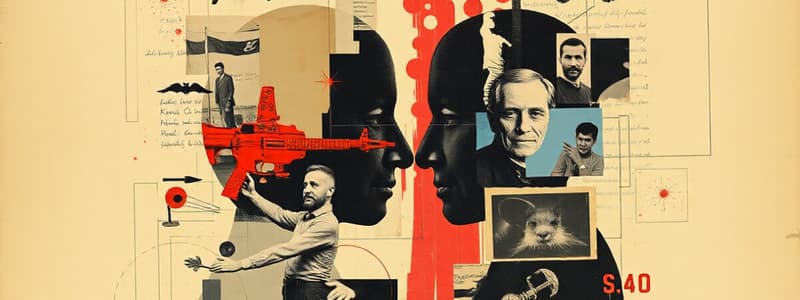Podcast
Questions and Answers
Which theory emphasizes the role of dominant groups in shaping public policy and law?
Which theory emphasizes the role of dominant groups in shaping public policy and law?
- Consensus Theory
- Symbolic Interactionism
- Functionalist Theory
- Conflict Theory (correct)
Informal mechanisms of social control are administered solely by the legal system.
Informal mechanisms of social control are administered solely by the legal system.
False (B)
What is the primary function of laws according to the Functionalist Theory?
What is the primary function of laws according to the Functionalist Theory?
To promote greater public welfare.
Group and culture conflict is an explanation of ________ and criminal behavior.
Group and culture conflict is an explanation of ________ and criminal behavior.
Match the following theories with their key ideas:
Match the following theories with their key ideas:
Flashcards
Conflict Theory
Conflict Theory
Society is divided into groups with different ideals and values. The more powerful groups control society and create laws that favor their interests, potentially punishing those who don't conform.
Socialization
Socialization
The process of learning and teaching values, norms, and behaviors within a society. It helps individuals understand and adapt to their social roles.
Consensus Theory
Consensus Theory
This theory suggests that laws reflect a general agreement within society about what is right and wrong.
Functionalist Theory
Functionalist Theory
Signup and view all the flashcards
Criminal Definitions
Criminal Definitions
Signup and view all the flashcards
Study Notes
Conflict Theory Overview
- Society is structured by competing groups with differing values and ideals.
- Dominant groups exert control over societal structures.
- Subordinate groups may adhere to their own norms, but potentially face consequences if they differ from dominant group norms.
- This group and cultural conflict influences law, crime, and criminal justice systems.
- Mechanisms exist for controlling deviation and promoting conformity.
- Informal mechanisms (family, friends) implement socialization to shape values and norms.
- Formal mechanisms (the law) are also used.
Two Competing Theories
-
Consensus Theory (Durkheim, Sumner, Weber)
- Laws represent societal agreements and shared values.
- Laws reflect widely accepted folkways and mores.
-
Functionalist Theory (Trevino)
- Law promotes public welfare by resolving disputes, regulating, and controlling crime symbolically.
Dominant Groups and Criminal Definitions
- Dominant groups shape public policy, law, and enforcement.
- Criminal definitions reflect conflicts between dominant and subordinate groups' values.
- The creation, breaking, and enforcement of laws directly reflect power struggles.
Social Characteristics and Influence
- Social characteristics (sex, race, age, social class) and social position (education, occupation, political stance) affect influence.
Studying That Suits You
Use AI to generate personalized quizzes and flashcards to suit your learning preferences.





